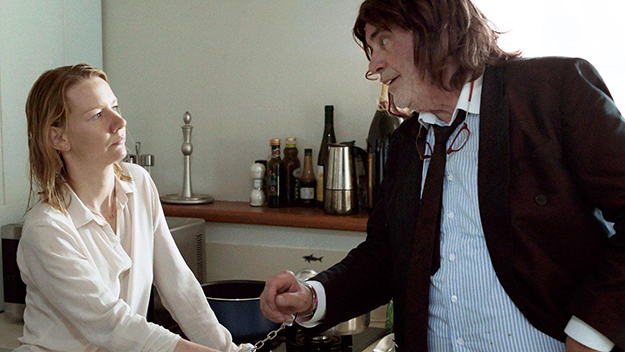*Toni Erdmann*, misunderstood masterpiece (full of spoilers)
Since no major English-language critic has made my major novel observation, can a flat-out wrong claim be considered a spoiler? I say the optimal time to read this post is in the middle of the movie, not before, not after. I’ll put the rest of under the fold…
First, Toni Erdmann is one of the most stimulating and multi-faceted movies I’ve seen in years, “utterly unique and wholly indefinable.” My non-spoiler plot summary is that an elite female German management consultant is called in to advise on outsourcing to Bucharest, and during the course of the movie she discovers she cannot get away from her father so easily.
Most of the core action unfolds after the woman’s father comes to visit her in Bucharest, and subjects her to an escalating series of escapades, mostly with co-workers. At least on the surface, the woman is efficient and worldly but emotionally stunted. Her father is rude and genuine and comic and self-destructive with his blundering interventions, unable to stop offending people, grabbing the attention, and repeatedly undercutting his daughter’s self-confidence. Everything has to be about him. As the movie progresses, however, the daughter learns she and her father are not so different after all.
What is this movie so good at?
Humor and comic set pieces. Staging a scene and subverting your expectations. Creating its own world, spread across a large and sprawling canvas (it’s almost three hours long). Expat life. The new German nationalism. Showing the multiple ways that women are condescended to or debased in the corporate world. Toadying. Rebelling by joining the establishment. The relationship between Germany and the economically colonized parts of Eastern Europe. The new principles of sex (and food). The emotionally unrewarding nature of contemporary cosmopolitan life, but also the limits of rootedness. And of course father-daughter dynamics and their persistence.
One rewarding way to watch the film is simply to track how many ways the German protagonist — in terms of her groveling, her rhetoric, and finally her complete nudity — is reduced to the status of her obsequious Romanian assistant. That’s factor price equalization with a vengeance.
OK, so what is the catch and major spoiler? I say this film uses a Fight Club-like trick, though unlike Hollywood it doesn’t feel the need to tell its viewers outright.
Most of the father’s Bucharest visit to his daughter never actually takes place (some of it probably does, though we cannot quite be sure). The father leaves Bucharest, and when the daughter supposedly runs into him again at a city bar, in his disguise, while she is talking about him to her friends, he isn’t really there. The coincidence of the encounter is too extreme and no attempt is made to explain it. And, after the conversation, when he leaves and climbs into the largest limousine you ever have seen (he’s a music teacher back home, not a CEO), that too is a sign this isn’t really happening. The unreality of his continuing visit also explains the succeeding odd medley of coincidences, and that she simply doesn’t tell him to cut it out and stop ruining her career. He is haunting her imagination, and no simple physical remedy will do.
If you do not understand this point, much of the movie will seem obnoxious and overstated, or even nonsensical. In fact a few reviewers have made this complaint (some reviews here); if your critic is employing the word “preposterous,” beware!
In my reading of the film, the handcuffs sequence is the key scene. The father comes along and handcuffs himself to the daughter, without having a key to open them up. That’s how she feels about her station in life. Eventually they find someone to pick the lock, but if you’re wondering why she tolerates this behavior, and immediately afterwards takes him to a bunch of work meetings and interviews…well, think Fight Club. She truly does carry him with her, no matter where she goes.
Also, for further clues, listen to the lyrics of the Whitney Houston song she sings at the Romanian party.
The now-famous nude party scene reflects how the daughter feels exposed and naked out in her job, much as she feels she never can escape her father. The appearance of the “furry creature” at the party then shows that her father — as a figment — will keep on coming back, in whatever extreme manifestations might be required.
Recall in the opening scene how the father is hiring/installing an imaginary daughter? She is mirroring this same behavior — also in a destructive way — by installing an imaginary father. The movie’s title, Toni Erdmann, of course refers to the father’s (supposed) alter ego, not to the father himself; that should be another clue.
People, no one gets this movie. It does have very positive reviews, but the American and British critics are missing the boat.
